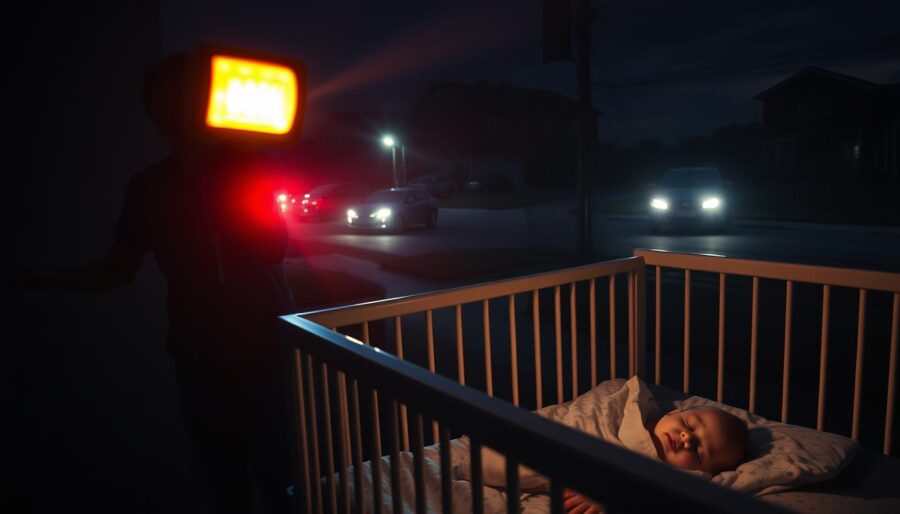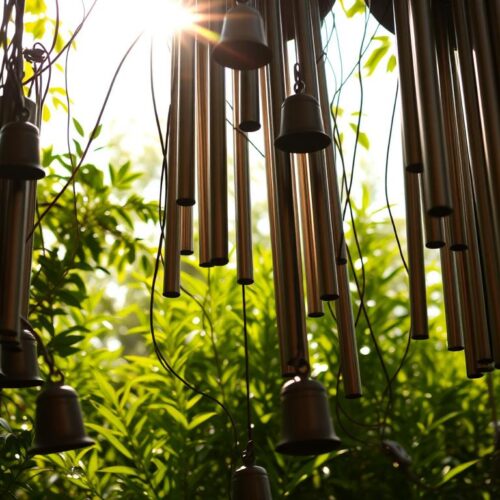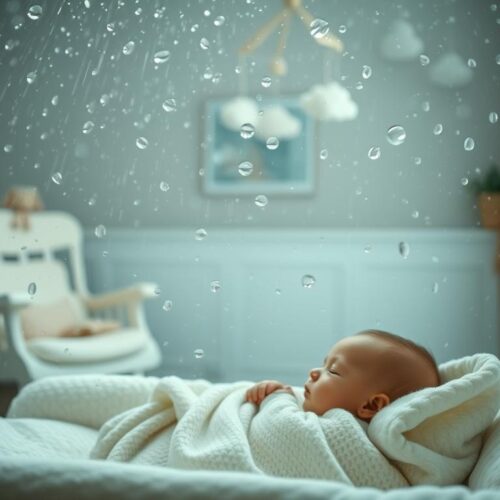Sudden noises like loud car alarms can wake your baby up at night. They can make stress levels go up and disturb your baby’s sleep. Here, we’ll talk about why car alarms are a problem, which sounds are too loud, and how to keep your baby’s sleep peaceful without being too watchful.
Babies have very sensitive ears. Experts warn that sounds louder than 85 dB are harmful. They suggest keeping noises under 60 dB, similar to normal talking. Loud noises can cause sleep issues, make a baby irritable, or have trouble paying attention. Early exposure to loud sounds can even harm hearing, learning, and mental health, studies show.
Our world is full of loud sounds. Sirens, trucks, construction, and car alarms are common in many areas. These sounds can wake your baby up and disturb their sleep pattern. It makes it harder for them to settle down again.
It’s important to keep an eye on your baby, but too much checking isn’t good. Being too vigilant might upset your baby’s feeling of safety. Stepping in before they try to calm themselves down can prevent them from learning important skills. Our aim is to keep your baby’s sleep calm without waking them up unnecessarily.
This guide will show you how to set up your baby’s room, monitor noises smartly, and protect their hearing gently. You’ll find out why car alarms disrupt sleep, what noise levels to watch out for, and how to minimize sleep disturbances for your baby without needing to constantly check on them.
Understanding Baby Sleep Patterns
Your baby sleeps differently than you do. Their sleep cycles include more changes between light and deep sleep, making it easier for them to wake up. This makes infant sleep seem short and easily disturbed, especially during their first year.
Loud noises at night, like a car alarm, may wake or upset your baby. These unexpected sounds can break into their light sleep. Over time, this can lead to more daytime fussiness and shorter naps.
The American Academy of Pediatrics has found that noise can cause sleep problems, tiredness, irritability, and difficulty focusing. It’s important to create a calm sleeping environment that works with your baby’s sleep patterns. This helps protect their rest while also meeting your family’s needs.
Watching over your baby too much might not be good. Reacting to every small noise teaches your baby to expect your presence all the time. Experts like Rebecca Hershberg and Erica Bronsnick recommend less intervention to help baby sleep better and give you more rest.
As your baby gets older, you can change how you use baby monitors. Many parents lower the sensitivity or set later alerts after their baby turns one. This balances safety with fewer disturbances for both you and your baby at night.
| Sleep Stage | Typical Duration in Infants | Noise Sensitivity | What Helps |
|---|---|---|---|
| Active (REM) | Short, frequent cycles across the night | High—startles common with sudden sounds and car alarms sleep spikes | Consistent background sound to stabilize baby rest |
| Quiet (Non-REM) | Builds gradually with age | Moderate—abrupt changes can still wake | Dark room, steady routine, limited monitor alerts |
| Transitions Between Stages | Frequent in early months | Very High—infant sleep cycles make arousals more likely | Gentle settling, pause before intervening, calibrated notifications |
What Are Car Alarms?
Car alarms are security systems for cars that make loud, sharp noises when they sense something unusual. These alarms use sounds that are strong and continuous to catch your attention quickly. They are made to be heard over city and outdoor sounds, acting like a horn or siren.
Every day, we hear these alarm sounds on the streets, in parking areas, and around living spaces. Kids playing outside hear them too, along with noises from roadwork and traffic. The sudden loud noise from car alarms can wake people who are sleeping lightly.
The loudness of different sounds gives us a clear idea of their impact. Emergency sirens can be as loud as 120 decibels, which is almost painful to hear. Traffic noise usually is around 80 decibels. Car alarms vary in loudness, but are always loud enough to be noticed, even startling babies during the night. Doctors suggest that babies should not be exposed to sounds over 85 decibels and recommend quieter settings near 60 decibels if possible.
Modern car alarm brands like Viper, Clifford, and Compustar use advanced sensors to spot any shocks, tilting, or glass breaking. These sensors then make the alarm go off, using loud chirps to warn people. Cars from Toyota, Ford, and Honda have built-in alarms that work with the car’s electronics. This helps them react quickly and can even make the lights flash.
| Source | Typical Sound Character | Approximate Level (dB) | Why It Stands Out | Relevance to Babies |
|---|---|---|---|---|
| Car alarms | Repeated high-intensity bursts | 80–110 (varies by model and distance) | Sudden onset and piercing pitch | Can startle and disrupt car alarms sleep |
| Emergency sirens | Wailing, rising and falling tones | Up to ~120 | Designed for maximum alertness | Risk of harm at close range |
| Traffic (urban noise) | Continuous engine and tire roar | 70–85 | Constant background layer | May mask or add to outdoor noise |
| Roadworks | Hammering, drilling, backup beepers | 80–100 | Irregular peaks and beeps | Spikes can rouse light sleepers |
The Noise Factor: Ideal Sleep Environments
Create a perfect sleep space by keeping noises soft and even. Experts say safe sound levels for babies are under 60 dB. Loud sounds, like car alarms or heavy traffic, should stay below 85 dB to keep the room calming.
The American Academy of Pediatrics recommends keeping noise low. A gentle background noise helps lessen jumps from loud sounds. Keep cribs away from windows, fridges, and laundry areas to maintain a quiet setting.
Be careful with how you use baby monitors. Experts like Shoshana Hershberg and Emily Bronsnick find that responding to every little sound can stop self-calming. Use a baby monitor that only alerts for loud, ongoing cries. This keeps the sleep environment steady and soothing.
| Sound Source | Approx. dB | What It Means for Baby Rest | Practical Tip |
|---|---|---|---|
| Whisper | 30 | Very low; unlikely to disrupt baby rest | Use for late-night check-ins |
| Normal conversation | 60 | Near safe decibel level for babies for everyday exposure | Keep voices soft near the crib |
| Passing car | 70 | May disturb light sleepers, especially during car alarms sleep surges | Close windows; add heavy curtains |
| Alarm clock, doorbell, vacuum | 80 | High; can interrupt naps and overnight cycles | Schedule chores away from sleep periods |
| Shouting | 90 | Too loud; risks startling and wake-ups | Move loud play to another room |
| Emergency sirens | 120 | Immediate risk; far above the safe decibel level for babies | Use sound-dampening shades and seal gaps |
Yes, create a room that blocks noise from the street but stays under the baby-safe sound level. Use thick rugs, door sweeps, and blackout curtains to control loud noises. These steps keep the sleep environment quiet, even during noisy times.
How Car Alarms Disturb Baby Sleep
At night, you face a tough problem: unexpected loud noises outside. Car alarms, with their sudden, high sounds, disturb your baby’s sleep. They break the silence needed for deep rest. Since babies have more light sleep cycles, even short noises can wake them up.
These noises quickly make babies startle. This reaction causes them to wake up slightly, many times at night. If this keeps happening, babies may wake up more often. They may also sleep less and have trouble getting back to sleep during common noisy times.
City nights add more noise stress. A car alarm might sound at the same time as sirens or honking. This mix of noises can make babies more grumpy and affect their sleep. Which, the American Academy of Pediatrics says, can make them fussier during the day and less focused.
Baby ears are very sensitive. If they hear loud noises too much, it can harm their hearing over time. The World Health Organization warns that too much noise can hurt their speaking and learning skills. Cutting down on loud noises can protect their ears and keep alarms from waking them up.
What you might notice: Babies might move suddenly in their sleep and need more comforting after being startled. These are signs they were frightened by a loud noise. This is common, especially when their sleep patterns aren’t fully set yet.
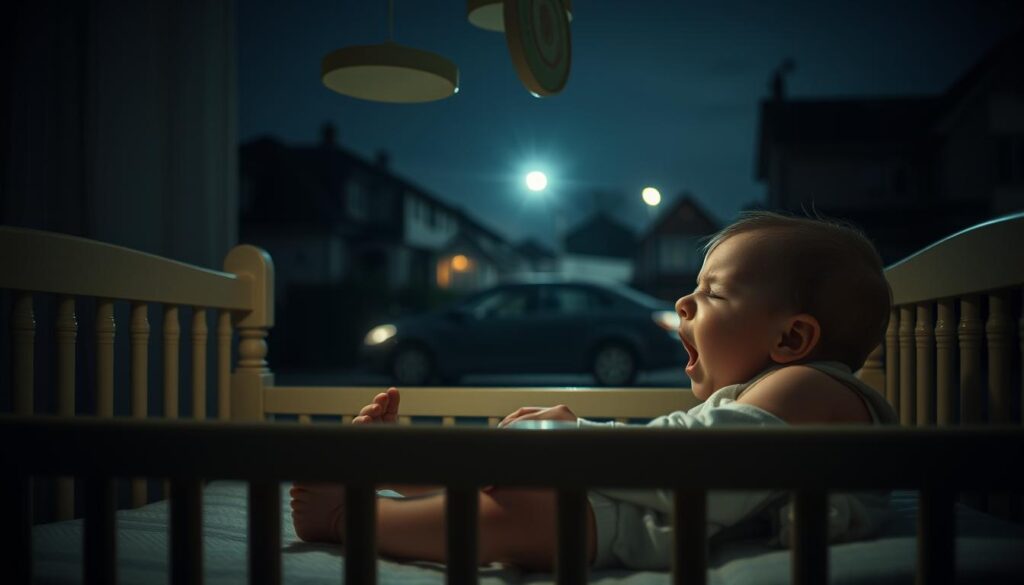
Parental Concerns About Car Alarms
You want your nights to be safe but not feel like you’re always on guard. The sound of a car alarm can make you worry when your baby starts to wake up. It’s important to know what’s really a threat and what’s not so you can keep your baby sleeping peacefully without stressing yourself out too much.
Some experts ask if using baby monitors too much is a good idea. Pediatrician Harvey Karp suggests sticking to calming routines. Psychologist Sara H. Hershberg wonders if being too watchful makes your child think sleeping is dangerous. This happens especially when car alarms make them wake up.
Therapist Carly Bronsnick points out that rushing to your baby too quickly can prevent them from learning to calm themselves. If your child relies only on you for comfort, both of you might feel more anxious. This can make sleeping difficult, especially when noises from outside interrupt the night.
It’s best to use baby monitors and sleep tools to keep your child safe and healthy, not to check on every little sound. Try to stay calm when you hear a siren from far away. Most noises won’t last long. Aim to provide care that is calm and predictable, instead of rushing to your baby’s side right away.
- Begin with setting your monitor to ignore quiet sounds during the baby’s first year.
- After 12 months, focus more on signals like movement or breathing, and reduce sound alerts.
- Wait a bit before you go to your baby to see if they can settle themselves first.
- Keep track of how often car alarms disturb your baby’s sleep to understand if it’s a common problem.
By adjusting how sensitive you are to alerts, you help ensure your baby sleeps well. This method helps manage your worry about noises without overly relying on baby monitors.
| Concern | What You Notice | Balanced Response | Benefit for Baby Rest |
|---|---|---|---|
| Sudden siren outside | Brief startle, light stirring | Wait 60–90 seconds before checking | Encourages self-soothing despite car alarms sleep spikes |
| Monitor pings all night | Frequent alerts for minor noises | Raise noise threshold; limit nonessential alerts | Reduces parental anxiety about noise and false alarms |
| Frequent parental check-ins | Baby settles only when you enter | Gradually increase response time | Builds independent settling with baby monitors and sleep support |
| Mixed signals at bedtime | Inconsistent routines and quick rescues | Set a calm, steady ritual before lights out | Stabilizes rhythms and protects baby rest |
Creating a Soothing Sleep Space
Let’s aim to keep the indoor sound below 60 dB during sleep. This helps babies sleep smoothly and lessens the shock of sudden outdoor noises. Use heavy drapes, plush rugs, and soft chairs to dampen echo and soften loud noises like traffic or alarms.
Make the nursery quieter by sealing its weak spots. Place draft stoppers and sweeps under doors to stop gaps. Seal windows to keep out street sounds. Also, try to put the crib away from windows and walls facing the street to reduce noise from outside.
Lower household noise levels before sleep time. Turn down TVs, music, and smart speakers. Stop using loud appliances like vacuums or blenders close to bedtime. They can reach up to 86 dB and interrupt a baby’s sleep. Shut doors around the nursery to further shield it from noise.
To maintain a steady noise level, consider using white noise. Set it to a volume that’s easy to talk over. Make sure it’s safe by checking with your pediatrician. Combine this with effective soundproofing methods for a gentle, layered approach to a quiet room.
| Tactic | Primary Benefit | Practical Tip | Notes |
|---|---|---|---|
| Soft Furnishings | Reduces reflections and sudden peaks | Use blackout curtains and a thick rug | Boosts nursery noise reduction without tools |
| Doors & Gaps | Blocks hallway and street bleed | Add door sweeps and draft stoppers | Fast upgrade for soundproofing for baby rooms |
| Crib Placement | Less exposure to street alarms | Move crib off window and exterior walls | Simple shift that protects baby rest |
| Appliance Timing | Prevents loud bursts at bedtime | Avoid vacuums and blenders at night | Cuts outdoor noise competition inside |
| White Noise | Masks abrupt changes | Keep volume modest and consistent | Complements other soundproofing for baby rooms |
Alternatives to Traditional Car Alarms
You want quiet nights and your car safe. Think about using smart, quieter alarm systems. Silent immobilizers from brands like Ghost and factory ones from Toyota or Ford block the car from starting without making noise. Coupled with GPS services like OnStar or Tesla, these options send quick alerts to your phone. This means fewer loud alarms that wake up babies.
Talk to your neighbors about reducing noise. Suggest they fix old alarms, change dead batteries, and tweak sensitive sensors. This prevents alarms from going off due to loud trucks or thunder. When everyone on your street does this, the area becomes quieter. This helps everyone sleep better at night.
Opt for quiet safety measures. Use motion-sensor lights from Ring or Philips Hue, etch your car’s VIN on windows, and put a visible steering wheel lock from The Club on. These actions warn thieves quietly. And with telematics alerts, you can act quickly while keeping the street peaceful.
A good system stops unnecessary alarms that stress everyone out. This means more stable naps and easier bedtimes for all. With less noise at night, your home stays more peaceful. At the same time, your car is securely protected.
- Choose immobilizers and GPS over loud sirens for smart car protection.
- Install motion lights to keep driveways lit without making noise.
- Turn on notifications in your car app for quick, quiet actions.
- Keep alarms and latches in good shape to avoid false alarms.
| Option | How It Works | Noise Impact | Baby Sleep Benefit | Typical Cost |
|---|---|---|---|---|
| Immobilizer (Ghost, OEM) | Prevents engine start without a coded sequence or key | Silent | No sudden sirens near windows | $$ |
| GPS/Telematics (OnStar, Tesla) | Sends phone alerts for tamper, tow, or movement | Silent | Rapid response without waking the house | $$–$$$ |
| Motion-Activated Lighting (Ring, Philips Hue) | Lights deter approach and aid cameras | Quiet; light only | Fewer startles during night feeds | $–$$ |
| Visible Steering Lock (The Club) | Physical barrier that is easy to see | Silent | No added neighborhood noise | $ |
| Sensitively Tuned Siren | Lower sensitivity, shorter chirp confirmation | Reduced volume and duration | Fewer false alarms after bedtime | $–$$ |
Using silent immobilizers, smart notifications, and calm lighting helps prevent theft. These actions also make the neighborhood quieter. This makes the silent alarm feature more effective. It keeps your family’s rest and your car safe.
Strategies for Minimizing Wake-Ups
To reduce baby wake-ups, make the room sound consistent. A steady white noise at around 50 dB helps. It softens loud noises like car alarms. Keep the nursery door ajar and use heavy curtains to block noise but keep air moving.
Wait a bit before you go to your baby. This is advice from psychologist Emily Bronsnick. She says waiting helps babies learn to calm themselves. If your baby calms down on their own, they won’t fully wake up.
Adjust how you monitor your baby to improve your sleep too. Lower the sensitivity of alerts as your baby gets older. Being less stressed helps you make better decisions. This improves your approach to handling noise at night.
If you need to move your baby at night, stay calm. Use dim lights and be gentle. Speak softly to help them stay calm, especially if there’s noise outside.
Use several methods together to limit night-time disturbances. A fan or a reliable white noise machine can make a big difference. Brands like Marpac Yogasleep or Hatch are good choices. Add soft door seals and keep bedtime consistent to help your baby sleep through noise.
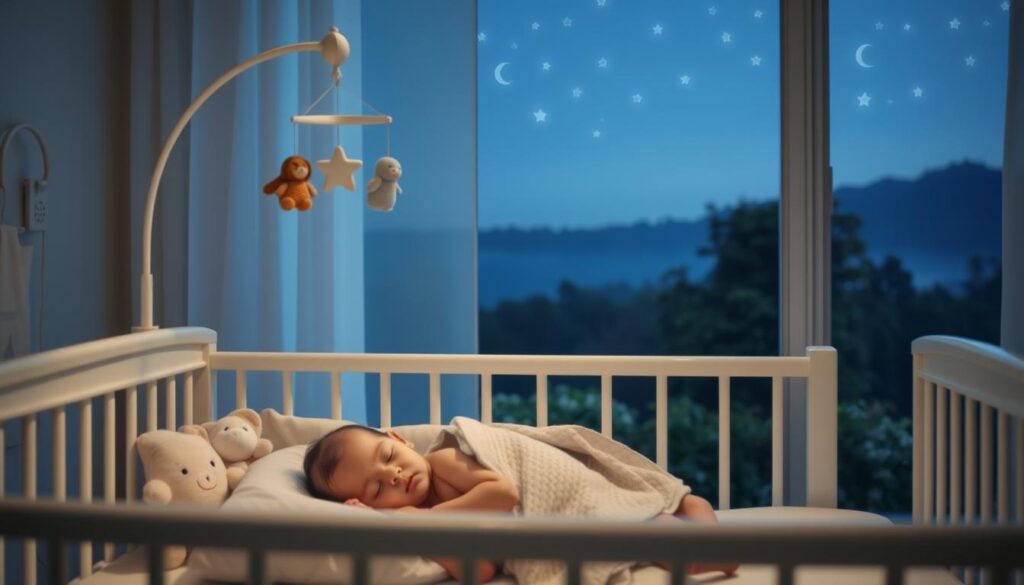
Signs Your Baby Is Disturbed by Noise
Check if your baby’s sleep changes throughout the week. Look for broken naps, short rests, and waking up a lot at night. If loud noises easily wake your baby, it might mean their sleep is getting disturbed.
Changes in how they act can tell you a lot. They might get grumpy at bedtime or want to stick by you after hearing loud noises. Feeling tired during the day, eating slower, and yawning more can also mean noise is bothering them.
Older kids might tell you when something’s wrong, like hearing ringing or buzzing sounds. If they keep talking about it, it’s a good idea to check with a doctor. This step makes sure your child’s sleep isn’t hurt by noise.
Write down when noises happen and match that to when your baby wakes up. This helps you figure out what’s disturbing their sleep. Soon, you’ll notice which sounds cause the most trouble at home.
| Observable Sign | What You’ll Notice | Likely Trigger | Action to Take |
|---|---|---|---|
| Frequent Night Wakings | Multiple arousals after midnight | Sudden sirens or car alarms sleep bursts | Log times; increase background masking; adjust bedtime routine |
| Difficulty Returning to Sleep | Awake longer than 20 minutes | Loud peaks that exceed room noise | Use consistent baby sleep cues; keep lights dim; avoid new stimuli |
| Daytime Tiredness | Short naps, extra yawns, slower play | Overnight disruptions from alerts | Protect nap windows; reduce morning noise; track recovery |
| Increased Irritability | Fussiness near bedtime | Repeated startles from honks or alarms | Strengthen wind-down; confirm baby rest signals before bed |
| Tinnitus Complaints | Ringing or buzzing mentions | High-volume or prolonged alerts | Seek pediatric guidance if lasting beyond 48 hours |
| Startle Reflex | Body jolts, flailing arms | Sharp, unexpected spikes | Swaddle if age-appropriate; stabilize sound environment |
Keep your notes clear and simple. Jot down when your baby wakes up, any sleep signs, and sounds nearby. Spotting noise problems early can help your baby sleep well, even with sudden loud noises in the area.
Educating Yourself on Noise Management
It’s important to learn about noise management. Aim to keep noise around your baby at 60 dB for everyday activities. Make sure to avoid sounds louder than 85 dB. Sounds like sirens can reach 120 dB, shouting might reach 90 dB, and things like alarm clocks or doorbells are often around 80 dB.
The American Academy of Pediatrics shows how loud noises can disturb sleep and focus. The World Health Organization shares how hearing loss from loud sounds can impact a child’s growth. Use their tips to create a quiet environment, especially during sleep times.
At your place, keep the TV and music volume low. Pay attention to the noise from appliances and toys. Toys should only reach up to 85–90 dB according to ASTM F963-23. If a toy is too loud, you can put tape over the speaker, or find a quieter toy.
Set a good example by wearing earmuffs when using loud tools. Limit the volume on electronic devices and take breaks from wearing headphones. These small changes can lead to better sleep.
| Sound Source | Typical Level (dB) | Risk to Baby Sleep | Action You Can Take |
|---|---|---|---|
| Car siren near street | Up to ~120 | Immediate risk; startle and wake | Seal windows, use heavy curtains, shift crib away from exterior walls to reduce outdoor noise |
| Shouting at home | ~90 | Exceeds safe decibel level | Lower voices, move heated talks outdoors, pause and resume after bedtime |
| Alarm clock/doorbell | ~80 | May interrupt naps | Use visual alerts or smart notifications; relocate devices away from nursery |
| TV or music in living room | 60–70 | Borderline for sensitive sleepers | Keep volume near 60 dB, enable night mode, close nursery door with draft stop |
| Popular toy with speaker | 85–90 | High if held close to ear | Reduce volume, add tape over speaker, follow ASTM F963-23 guidance |
| Passing traffic | 55–75 | Can fragment sleep | Choose rear bedroom, use window inserts, create a buffer with bookshelves or rugs |
- Keep nursery sound near a safe decibel level of 60 dB during sleep.
- Track spikes from outdoor noise with a phone meter; aim for stable readings.
- Plan a response for sudden car alarms sleep disruptions: soothe, pause, then settle.
- Schedule quiet hours at home and share them with caregivers and neighbors.
The Role of White Noise Machines
White noise smooths out the loud and quiet sounds in your house. It helps sudden noises like honks blend in. This even sound helps babies sleep, even when loud noises happen in the night. Pick one sound, like rain or a fan, and make sure it doesn’t have a loop that stops and starts.
It’s important to keep the volume of white noise safe. Aim for 60 dB in the room where your baby sleeps. Don’t go above 85 dB. Keep the noise machine a bit away from the crib, not right next to your baby. If possible, check the volume with an app to make sure it doesn’t change overnight.
When you’re out, like in busy cities or during travel, combine white noise with ear protection for your baby. This is helpful during loud events like parades or fireworks. While it can’t stop all sudden noises, it helps soften the loud ones that might wake your baby up.
Age-Appropriate Hearing Protection to Support Baby Rest
- Alpine Muffy Baby Classic (up to 36 months): reduces noise by up to 23 dB; suitable from around 12 months per the manufacturer.
- Alpine Muffy Baby (up to 48 months): reduces by up to 24 dB and contains no metal parts, making it MRI-safe; suitable from around 12 months per the manufacturer.
- For older kids: Alpine Muffy Kids (5+) and Alpine Pluggies Kids (about ages 3–12) help protect against harmful noise and water ingress.
During flights, train trips, and visits to stadiums, these products help. They prevent too much stimulation, helping your child fall asleep easier. By using a comfortable volume of white noise and the right ear protection, you can keep sudden loud noises from waking your baby.
Summarizing the Relationship Between Car Alarms and Sleep
Car alarms are a part of the puzzle about outdoor noise affecting baby sleep. Sudden loud sounds from alarms or honking can interrupt sleep. This causes irritability and tiredness in babies, as noted by the American Academy of Pediatrics. This summary connects research to real life, showing that sudden loud noises wake babies more often than constant noise does. Your aim is to reduce the impact of these loud sounds and ensure peaceful nights.
First, focus on setting up the nursery right. Try to keep the noise level around 60 dB and avoid anything over 85 dB. Add heavy curtains, door sweeps, and soft furnishings to absorb sound. A well-chosen white noise machine can dull sharp noises without hiding your baby’s cries. These steps will help your baby sleep better, even with car alarms and other city noises around.
How you react is also key. As your baby grows, help them learn to soothe themselves. You can do this by checking on them less and adjusting your baby monitor settings. This follows advice from sleep experts like Rebekah Hershberg and Emily Bronsnick. Strive for a balance between being attentive and fostering independence. Show your child how to stay calm at night so they can sleep well, even with noise outside.
On nights when noise is high—due to events, travel, or living on a busy street—consider using hearing protection for your baby. Good options include products like the Alpine Muffy Baby series. Always listen safely. Over time, work towards having fewer false alarms and quieter security systems in your area. Making these changes will lessen night-time disturbances from car alarms. This will help protect your baby’s sleep in the long run, making this summary a practical guide for you.

